by Naomi L. | July 27, 2016 | Blog, Creative Writing, Featured |
If you read my recent post about the progress on my 2016 reading goals, you may have noticed I’ve been reading a lot of period fiction this year, and it’s really been inspiring my fascination with history! I love reading stories set in the past for much the same reason I enjoy science fiction and fantasy: they show me a world I could never see or experience for myself. And what more could you want from a fiction genre?
So continuing through my “five reasons” series, here’s a list of five reasons I love historical fiction. Enjoy!
1) It offers a deeper insight into human history.
History is fascinating, but there’s only so much we can learn from textbooks and history lessons in school. It’s one thing to read facts about past events, it’s another to live them. And while living said events ourselves would only be possible with a time machine, we can at least get a taste of what they were like through the immersive experience of narrative. Action, emotion, drama, all the things that make us human have the power to make a historical account much more engaging and relatable. That’s why I feel like I learn more about history from certain fiction books than I ever did from history lessons growing up: you can only really understand the driving forces behind human history when you feel like you’re reading about, you know, actual humans!
2) It shows the evolution of human behavior.
Reading many works of historical fiction set in various time periods gives readers the opportunity to observe how human behavior has changed over the centuries. What ancient civilizations once believed to be the work of the gods, we now approach as topics of science, and several subjects that seem commonplace to us today were once considered too shocking and scandalous to even be mentioned in proper society. Human beings drastically alter their ways of thinking over generations, so indulging in historical fiction offers an entertaining means of seeing those changes: through a narrative timeline!
3) It reveals the most consistent traits of human nature throughout time.
On the other hand, historical fiction can also show us the things that haven’t changed over time. After all, no matter how far we’ve come as a species since the dawn of mankind, human beings technically still are and always have been animals. There’s a reason history tends to repeat itself, and many authors like to explore the most consistent patterns of society by implementing elements of past events into present- and future-setting stories. This is where historical fiction ties in with many futuristic works: the most fundamental human traits – love, fear, survival instinct, social bonds, etc. – often become the driving forces behind major events like war and revolution, regardless of generation or time period, past or future. And speaking of the future…
4) It helps predict the future course of human history.
It may seem odd at first to think knowing the past is the key to predicting the future, but my dad always taught me that it’s important to study history because only by understanding humanity’s past mistakes can we hope to avoid repeating them. When you have a clear picture of the direction in which the human race has been heading for the past few millennia, it becomes easier to predict which areas we’ll progress in and which patterns we’ll keep falling into. And as mentioned above, this often makes for great futuristic fiction material. For example, technology continues to improve at an accelerated rate, but there will always be people who try to use it for the wrong reasons. If history really does repeat itself, then the one thing you can expect with absolute certainty from future generations is that they’ll keep making the same mistakes their ancestors did for thousands of years!
5) It makes for entertaining reading!
This is just my opinion, of course, but there’s something vastly entertaining about diving into a book set in a past time period. It’s like stepping into a time machine and being transported back to days when people acted and thought differently, technology wasn’t quite as advanced, and society had expectations that would greatly contrast with our modern-day views. I especially enjoy historical literature that was written during the time period in which it takes place, as it offers the additional insight of authors who experienced those times firsthand. To be able to see the past through the eyes of people who lived it is what makes historical fiction such a unique and fascinating genre!
What about you? Do you enjoy historical fiction? What do (or don’t) you like about it?
by Naomi L. | July 6, 2016 | Blog, Creative Writing |
Are we already halfway through 2016? How did that happen? Time is an evasive little thing, isn’t it? Anyway, we’re going into July now, so I figured now is the perfect time for a quick break to assess the progress on my 2016 reading goals. How am I doing so far? Let’s see!
My Reading Goals
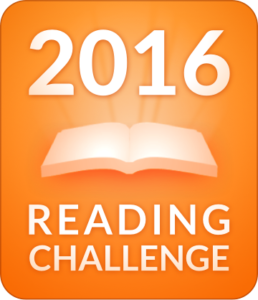 At the beginning of the year, I set a goal to read ten books for the Goodreads 2016 Reading Challenge. I even shared a couple of blog posts in January detailing which books I wanted to read this year. It seemed like a reasonable goal for me; I wanted to push myself to start reading more fiction again and finally take up those untouched books sitting on my shelf, but I also couldn’t set the bar too high for fear of falling behind due to school. Ten books a year is fewer than a book a month, and while that may not seem like much to truly avid readers, it’s proven to be an excellent starting point for me, as I’m already more than halfway to my goal!
At the beginning of the year, I set a goal to read ten books for the Goodreads 2016 Reading Challenge. I even shared a couple of blog posts in January detailing which books I wanted to read this year. It seemed like a reasonable goal for me; I wanted to push myself to start reading more fiction again and finally take up those untouched books sitting on my shelf, but I also couldn’t set the bar too high for fear of falling behind due to school. Ten books a year is fewer than a book a month, and while that may not seem like much to truly avid readers, it’s proven to be an excellent starting point for me, as I’m already more than halfway to my goal!
I plan to write an in-depth post on my 2016 goals at the end of the year, but for now, here’s a quick recap of the books I’ve read so far, am currently reading, and still plan to read:
Books I’ve read so far
- Fantastic Beasts and Where to Find Them, by J.K. Rowling
- The Tales of Beedle the Bard, by J.K. Rowling
- Jonathan Livingston Seagull, by Richard Bach
- Pride and Prejudice, by Jane Austen
- The BFG, by Roald Dahl
- The Taming of the Shrew, by William Shakespeare
- The Picture of Dorian Gray, by Oscar Wilde
Books I’m currently reading
- Little Women, by Louisa May Alcott
- A Game of Thrones, by George R.R. Martin
Books I still plan to read
- Sense and Sensibility, by Jane Austen
- Wuthering Heights, by Emily Brontë
- The Hunger Games, by Suzanne Collins
What about you? Any goals you’re still working toward this year? Which ones have you completed, if any?
by Naomi L. | June 22, 2016 | Blog, Creative Writing |
When it comes to looking for creative inspiration, sometimes you needn’t look farther than your own family. Plenty of my characters and stories have been inspired by my family members (you know who you are), but today I’d like to honor someone special by focusing on the inspiration that can be found in some of our oldest and most beloved relatives: grandparents!
So for today, here are three creative writing themes that can be found in the loving relationships shared with our grandparents! Enjoy!
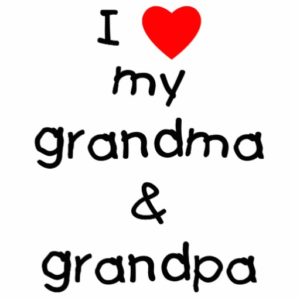 1) Family Love
1) Family Love
There’s no love like family love, and speaking from experience, grandparents have a lot of that to offer. My grandparents always treated me and my sisters like the greatest treasure of their lives when we were growing up, and that love remains strong with us today, even if most of our grandparents no longer are. In fact, some of my favorite love stories and poems to write aren’t even about romance, but family. It’s the most unconditional kind of love you can find, so if you were lucky enough to be spoiled by your grandparents growing up, I highly recommend using that experience as inspiration for some sweet family love stories of your own!
2) Family History
As I’ve mentioned in the past, grandparents can be excellent sources of stories about your own family history. Most grandparents do love to tell stories about their lives, and those stories can be extremely valuable to a young audience, especially budding writers. It’s only natural to want to know where you come from and what mistakes you should avoid making as you grow older (even though you’ll probably make most of them anyway), so if your grandparents are still around, it may be worth sitting in for a few experience-based history lessons if you haven’t yet. Who knows? Your grandparents may just help you find inspiration for your most interesting writing in the stories of your own family’s past!
3) Respect for elders
If you have childhood memories of your grandparents, you may remember being taught to treat them with the utmost respect. No matter how much they spoiled you or treated you like a close friend, you were still expected to listen to them and always put them first. At least, my sisters and I were. Showing respect for our elders is an important lesson that we should practice our whole lives, so as long as you hold on to those memories of respecting your grandparents, you’ll likely find it easier to write older characters and their relationships, especially with younger characters. After all, if there’s one thing grandparents love to teach their grandchildren, it’s the value of healthy and loving relationships!
What about you? Have you ever found creative inspiration in your grandparents? What kinds of stories or poetry have they inspired?
Today’s post is dedicated to my grandmother, whose love has always been a wonderful inspiration to me. Happy Birthday, Grandma! I love you!
by Naomi L. | May 4, 2016 | Blog, Creative Writing |
A year ago, I shared a blog post dedicated to two of the most important people in my life: a list of lessons on romance inspired by the love I’ve seen between them my whole life. I learned almost everything I know about love from them, which is why most of the romantic stories I write are about couples who started out as friends. If my parents taught me anything about romance, it’s that the best kind of love is based on friendship!
So to honor them again this year, here’s a new list of five details of loving relationships that you’re more likely to see in couples who started as friends. Keep these in mind if you ever write romance that blossoms from friendship! Enjoy!
1) You enjoy each other’s company.
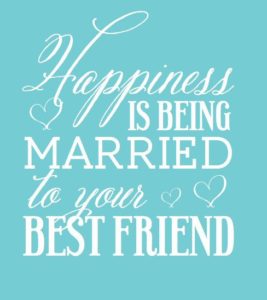 This one is a bit obvious, but it deserves to be pointed out nonetheless. You choose your friends based on how much you like them, and that depends on how much you enjoy spending time with them. Logically, the same principle should apply to romance: if you like being with your partner, you make an effort to prolong your relationship. One of the great advantages of starting out as friends is that you already know you like each other by the time you get together. When you already have fun together and make each other laugh often, the romance simply enhances an already beautiful connection. It’s like fast-forwarding through the awkward getting-to-know-you phase to the actual fun part of a relationship! Admittedly this might not be to everyone’s taste, but I highly recommend it. It worked for my parents, and it’s certainly working for me!
This one is a bit obvious, but it deserves to be pointed out nonetheless. You choose your friends based on how much you like them, and that depends on how much you enjoy spending time with them. Logically, the same principle should apply to romance: if you like being with your partner, you make an effort to prolong your relationship. One of the great advantages of starting out as friends is that you already know you like each other by the time you get together. When you already have fun together and make each other laugh often, the romance simply enhances an already beautiful connection. It’s like fast-forwarding through the awkward getting-to-know-you phase to the actual fun part of a relationship! Admittedly this might not be to everyone’s taste, but I highly recommend it. It worked for my parents, and it’s certainly working for me!
2) You know each other well and accept each other for who you are.
There’s nothing wrong with a little mystery in romance, but it’s so great when you don’t have to hide every little flaw you might have for fear of driving your partner away. A true friend is someone who not only knows almost everything about you, but accepts all the things that make you you, good and bad alike. In my experience, the freedom to openly express yourself and everything you like to your partner makes a relationship much more enjoyable in the long run, especially when that freedom is mutual. Let’s face it, you can’t hide your real self forever and you should never try to change yourself to please someone else, so if you’re lucky enough to fall for a friend who already loves you exactly the way you are, I say keep them!
3) You respect and value each other more.
You wouldn’t be friends with someone you don’t respect, right? So it stands to reason that if you’re romantically involved with someone you consider a friend, you’re much more likely to treat them as an equal. Respect is key in any relationship that hopes to last, so lovers who started as friends have the advantage of already beginning on an equal footing. This makes it much easier to build and maintain a healthy relationship: by respecting and valuing one another, you’ll help each other grow and become better people over time!
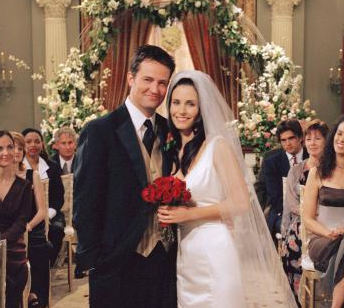
Move over, Ross and Rachel; Monica and Chandler are the real greatest couple of Friends!
4) You have greater intimacy with each other.
Ah, the best part of being in love! Superficial flings may be appealing to some, but when it comes to long-term commitment, romances based on friendship definitely have the upper hand. Enjoying each other’s company and knowing each other well leads you to trust each other completely, and with trust comes greater loyalty and intimacy. A deep emotional connection with another person is something most of us search for our whole lives (and many of us never find), so your best chance at finding such intimacy is with someone you’d consider your best friend!
5) Your love is more likely to last forever!
 For all the above reasons and more, lovers who started as friends are more likely to stay together for life. Friendship is the most solid foundation for love because life is most enjoyable when shared between two people who enjoy talking to each other, often make each other smile, understand each other well, and value each other for who they truly are. So try exploring this kind of love in your romantic stories, and maybe if you’re as lucky as my parents, you too will discover (or perhaps already know) that the best romance is based on friendship!
For all the above reasons and more, lovers who started as friends are more likely to stay together for life. Friendship is the most solid foundation for love because life is most enjoyable when shared between two people who enjoy talking to each other, often make each other smile, understand each other well, and value each other for who they truly are. So try exploring this kind of love in your romantic stories, and maybe if you’re as lucky as my parents, you too will discover (or perhaps already know) that the best romance is based on friendship!
What are your favorite kinds of romance? Do you write stories about love that starts as friendship?
Today’s creative writing post is dedicated to my parents, the happiest couple I know. Thank you for teaching me the value of love founded on friendship! Happy Anniversary, Mom and Dad! I love you both so much!
by Naomi L. | April 6, 2016 | Blog, Creative Writing, Featured, Tropes |
What’s life without whimsy? Laughter truly is the best medicine, which is why many writers like to include a little comedy even in dramatic works. Humor is one of the most appealing genres of fiction, but it’s also one of the most challenging to write. That’s where humor tropes come in! When in need of a little comedy, a good humor trope may be just the thing to lighten the mood and keep your stories from becoming too grim.
So in the spirit of April Fools’ month, here are five of my favorite humor tropes. I hope you’ll find these as entertaining as I do! Enjoy!
1) Lampshade Hanging
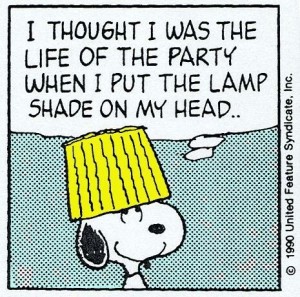 Lampshade Hanging is easily my favorite humor trope. I wrote a whole post about it in my first few months of blogging! I just love when fictional characters draw attention to the ridiculousness of a situation they’re in, almost as if they’re purposely leaning on the fourth wall to let the audience know they “see it too”. The practice of “hanging lampshades” is a handy technique writers use to demonstrate their own awareness of intentional details in their stories that would otherwise be dismissed by the audience as mistakes or simply bad writing – a sort of “self-deprecation” device, if you will. Note that the best way to use a lampshade in comedy is as a standalone comment: bring it up once, then move on and never mention it again. A classic way to entertain your audience while keeping the critics at bay, Lampshade Hanging is a great go-to trope for adding a touch of clever humor to your stories!
Lampshade Hanging is easily my favorite humor trope. I wrote a whole post about it in my first few months of blogging! I just love when fictional characters draw attention to the ridiculousness of a situation they’re in, almost as if they’re purposely leaning on the fourth wall to let the audience know they “see it too”. The practice of “hanging lampshades” is a handy technique writers use to demonstrate their own awareness of intentional details in their stories that would otherwise be dismissed by the audience as mistakes or simply bad writing – a sort of “self-deprecation” device, if you will. Note that the best way to use a lampshade in comedy is as a standalone comment: bring it up once, then move on and never mention it again. A classic way to entertain your audience while keeping the critics at bay, Lampshade Hanging is a great go-to trope for adding a touch of clever humor to your stories!
2) Brick Joke
It’s gonna be legen… wait for it… [falls asleep]
You know when a joke is set up at one point in a story only for the punchline to come later, when you’ve almost forgotten about it? Well, that’s a special kind of humor device called a Brick Joke. This is the comedic version of the Chekhov’s Gun, when the conclusion to a funny scene is delivered separately from its beginning after several unrelated events have happened in between. This trope is named after an old joke consisting of two parts, the first ending with an underwhelming punchline about a brick and the second ending with a twist that recalls the same brick. The humor of a Brick Joke comes from subverting the audience’s expectations: what at first appear to be separate situations turn out to be two parts of the same joke. To properly execute a Brick Joke, scatter a few jokes between the set-up and the punchline so as to either dissuade the audience’s suspicion that the first part was building up to a joke or trick them into thinking the first part was the joke. With the right timing, this trope can score major laughs from your readers! They won’t know what hit ’em!
[5 minutes later; waking up when the door slams] -dary!
– Barney Stinson, How I Met Your Mother (Season 2, Episode 11 – How Lily Stole Christmas)
3) Running Gag
A sister trope of the Brick Joke, the Running Gag is another popular comedic device, especially in TV series. It’s also one of the riskiest; when done poorly, it quickly becomes annoying, but when done well, it can rake in a lot of laughs. A Running Gag is basically a joke that’s repeated over the course of a story or series (a minimum of three times), sort of like a recurring punchline to the same Brick Joke. It usually involves the same character(s) each time it comes up, though this needn’t be the case when the humor of the gag is entirely in the action itself. The key to a good Running Gag is timing: space the punchline recurrences far enough apart to keep the joke from wearing out too quickly, but add enough recurrences to draw as much laughter from the audience as possible. This may take a lot of practice to get right, especially since humor is so subjective, but once you get the hang of it, the Running Gag can make an excellent addition to your arsenal of comedy tropes!
4) I Resemble That Remark
Amy: You were being totally obstinate!
Knuckles: I don’t know what “obstinate” means, but I refuse to learn.
– Sonic Boom (Season 1, Episode 22 – The Curse of Buddy Buddy Temple)
Sometimes in comedy, one character will call another out on a flaw, only for this second character to object… in a way that demonstrates the exact flaw they’re denying. I Resemble That Remark is one example of the many humorous uses of irony, in this case comically subverting characters’ perceptions of themselves. It’s one of those comedic devices that draws its humor from an element of truth, as it plays on the all-too-common scenario where a trait that a person will swear is nothing like them will in fact turn out to be one of their defining characteristics. Think of it as an exercise in learning to laugh at yourself; if you find yourself identifying with fictional characters who can’t see their own shortcomings, maybe it’s time to reevaluate that idealized self-image!
5) Hypocritical Humor
Mike: I’m gonna go to the bathroom.
Phoebe: Okay, well you put down the toilet seat.
Mike: Yes, dear. [leaves]
Monica: Is that a bit you guys do?
Phoebe: Uh-huh, we’re playing you two.
Monica: We don’t do that! [to Chandler] Tell her we don’t do that!
Chandler: Yes, dear.
– Friends (Season 9, Episode 16 – The One With The Boob Job)
The previous item on this list is a subtrope of a device known as Hypocritical Humor. This trope comes in a variety of flavors: saying one thing and doing the exact opposite, exhibiting a behavioral flaw immediately after denying said behavior, criticizing or making fun of others for faults of which the accuser him- or herself is guilty, or ignoring several warnings of an impending event only to get upset when said event happens. One particularly hilarious form of this trope is when the irony comes from the universe aligning itself exactly right to contradict a statement the exact moment after someone says it, which can either be a way of tempting fate or invoking karmic justice, depending on the nature of the statement. Note that Hypocritical Humor in fiction constitutes jokes that are intentionally added to a story to be played for laughs; unintentional hypocrisy is more likely attributable to bad writing and, in cases where it still evokes some laughter, may fall under a phenomenon known as Narm (that is, what is meant to be serious but is accidentally funny instead). Be careful how you deploy that hypocrisy in your fiction!
What are your favorite humor tropes? Which humor tropes have you used in your stories?
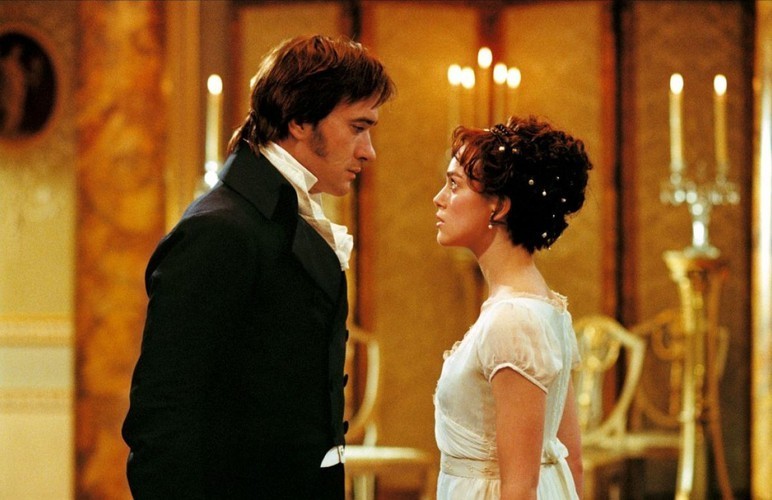
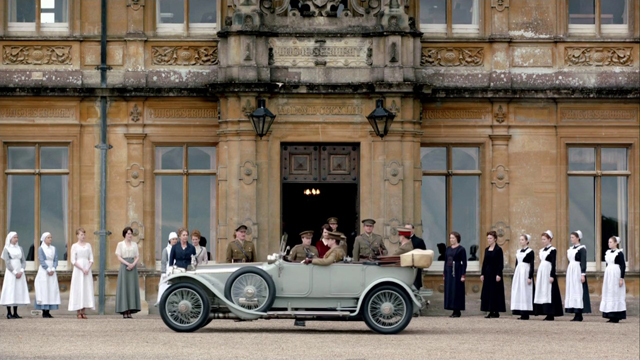


 1) Family Love
1) Family Love This one is a bit obvious, but it deserves to be pointed out nonetheless. You choose your friends based on how much you like them, and that depends on how much you enjoy spending time with them. Logically, the same principle should apply to romance: if you like being with your partner, you make an effort to prolong your relationship. One of the great advantages of starting out as friends is that you already know you like each other by the time you get together. When you already have fun together and make each other laugh often, the romance simply enhances an already beautiful connection. It’s like fast-forwarding through the awkward getting-to-know-you phase to the actual fun part of a relationship! Admittedly this might not be to everyone’s taste, but I highly recommend it. It worked for my parents, and it’s certainly working for me!
This one is a bit obvious, but it deserves to be pointed out nonetheless. You choose your friends based on how much you like them, and that depends on how much you enjoy spending time with them. Logically, the same principle should apply to romance: if you like being with your partner, you make an effort to prolong your relationship. One of the great advantages of starting out as friends is that you already know you like each other by the time you get together. When you already have fun together and make each other laugh often, the romance simply enhances an already beautiful connection. It’s like fast-forwarding through the awkward getting-to-know-you phase to the actual fun part of a relationship! Admittedly this might not be to everyone’s taste, but I highly recommend it. It worked for my parents, and it’s certainly working for me!
 For all the above reasons and more, lovers who started as friends are more likely to stay together for life. Friendship is the most solid foundation for love because life is most enjoyable when shared between two people who enjoy talking to each other, often make each other smile, understand each other well, and value each other for who they truly are. So try exploring this kind of love in your romantic stories, and maybe if you’re as lucky as my parents, you too will discover (or perhaps already know) that the best romance is based on friendship!
For all the above reasons and more, lovers who started as friends are more likely to stay together for life. Friendship is the most solid foundation for love because life is most enjoyable when shared between two people who enjoy talking to each other, often make each other smile, understand each other well, and value each other for who they truly are. So try exploring this kind of love in your romantic stories, and maybe if you’re as lucky as my parents, you too will discover (or perhaps already know) that the best romance is based on friendship! Lampshade Hanging
Lampshade Hanging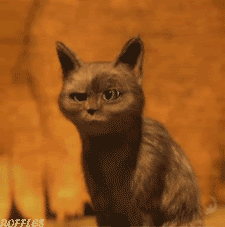
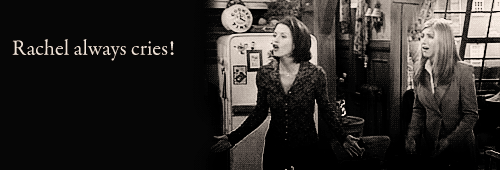

Recent Comments